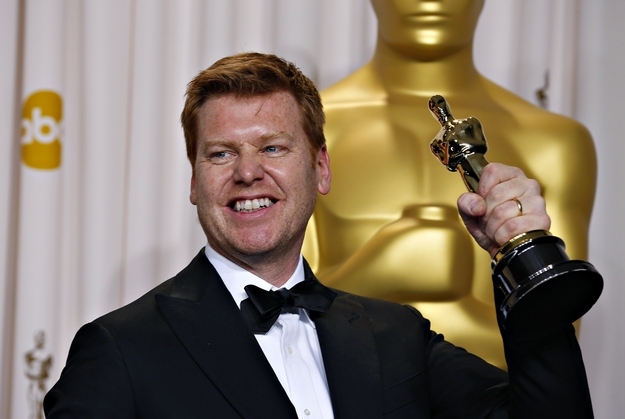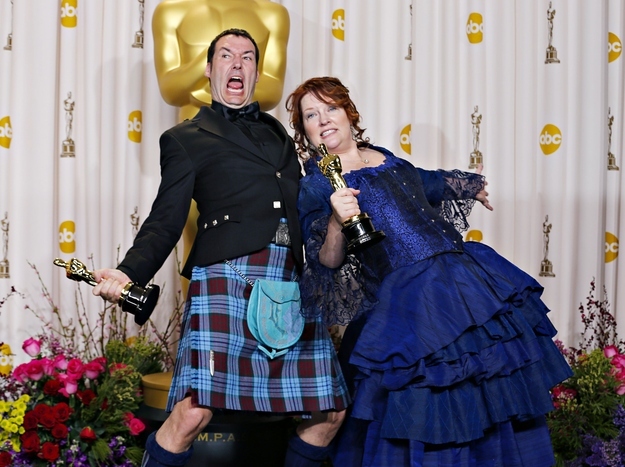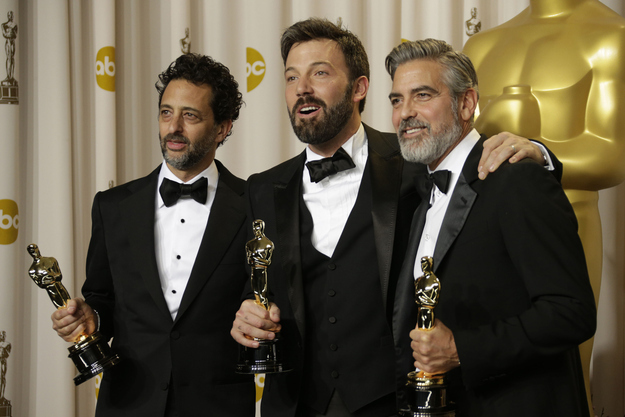
The press room backstage at the Academy Awards can be a stultifying affair. It is all too common to watch credentialed members of the entertainment press ask, say, Best Actor winner Daniel Day-Lewis what it was like to wear Abraham Lincoln's beard ("What do you mean, wearing it?"), or lob incomprehensible queries to Quentin Tarantino about whether he believes the human body has bones. (Big scoop: He does.) Even when the questions and answers are thoughtful, most reporters have their attention split three ways, between the winner speaking, the show itself, and whatever story they're madly scrambling to write at that moment. It is not generally a place for penetrating journalistic insight, is what I'm saying.
Which is why David Arquette — an affable, unthreatening actor best known for the Scream movies, amicably divorcing Courteney Cox, appearing on Dancing With the Stars, and giving Adam Lambert a birthday lap dance — provided the press room with such an unexpected jolt when he showed up as a correspondent for Howard Stern's Sirius Radio show. I happened to be the reporter sitting directly across from him at our long and narrow press table, and what at first seemed like a fun and silly stunt quickly became a fascinating demonstration of a celebrity contending with the limits of his own fame.
At first, I didn't even believe it was David Arquette. When I first saw him from across the room, I did a double take. But even when I placed my laptop right in front of his radio recording equipment, I still had a hard time grasping at the notion that someone famous would ever want to be in the Oscars press room. When I finally did introduce myself, however, he offered a quick, easy smile. "Hi," he said, taking my hand. "I'm David."
He told me that his ongoing relationship with the Howard Stern show led them to send him to the Oscars press room, and he also mentioned that his girlfriend, Christina McLarty, works as a journalist at Entertainment Tonight, which led him to wonder how the other half lives. As more press began filing into their seats before the start of the show, he began mining the reporters around him for intel on how the Oscars press room works. It was patiently explained to him that each reporter has a number they hold up, an Academy official calls out their number, the reporter waits to be handed a mic, and then he or she asks their one question — and usually only six or so questions are allowed per category. "You don't just yell out?" Arquette asked, incredulous as he began to realize he may not be able to get in all the questions he had carefully printed out and highlighted.
It turned out he had good reason to be concerned.

The first person to come back in the press room was Best Supporting Actor winner Christoph Waltz (Django Unchained). Arquette's hand shot up holding his number, 171. After three questions, the business-like Academy official running the room called his number. Arquette had his chance.
"Hello, Christopher," he said to Waltz. Immediately, I could see reporters jerk their heads up at the vaguely familiar sound of a famous person's voice. "Congratulations…Your second Oscar. I've been acting 23 years and I've never won an Academy Award." By this point, pretty much everyone in press room had realized a real live celebrity was among them. Several began to laugh.
"I did it at 38," Waltz said. "So…"
"I'm 41," interrupted Arquette, plowing ahead. "But you are an incredible actor. In light of the subject matter of your film, are you excited about the possibility of a black pope?"
As more reporters began to titter and cackle at the sudden irreverence that had crashed their press room, Waltz answered Arquette's question with as much grace and sincerity as he could muster. "It would be an exciting thing," Waltz said. "I am a very adamant non-racist. I don't care whether the pope is black or white or whatever color. If we are non-racist, then we have to stay non-racist all the way."
Arquette grinned, and sat back down. He was obviously having fun. Once Waltz left the stage, however, a steady stream of journalists began to approach Arquette to ascertain why, precisely, he was there. Arquette gamely answered everyone's questions — he was there for Howard Stern; his girlfriend's a journalist; he applied for a credential; etc. He handled the attention like a seasoned pro, but the strangeness of reporters interviewing someone who is ostensibly a fellow reporter did not appear to be lost on Arquette.

The next person to enter the press room was Best Animated Short winner John Kahrs (Paperman). Again, Arquette's hand shot up. Again, the Academy official running the room called on him. And this time, Arquette decided he could push things even further.
"Congratulations," he said. "I loved your film."
"Thank you," said a startled Kahrs, who quite understandably did not expect to be fielding questions from minor celebrities.
"I'm an actor, David Arquette," said Arquette, to even louder laughter from the room. "I do lots of voices." He dropped his voice comically low: "I can do a low voice." He raised his voice into a high, girlish twinkle: "I can do a high voice." I couldn't help but flinch a little when I realized he was doing a full-on comic bit — the cognitive dissonance was beginning to get to me.
"This is my next step," said Kahrs, actually attempting to respond to Arquette. "Because I didn't use any words [in Paperman], so this is the thing I'm terrified of: actually putting voices in the animations."
Normally, this would be the end of the exchange, but Arquette either forgot about the one question rule, or just ignored it. "So put nice actors [in your film]," he said, seemingly oblivious to the Academy official trying in vain to take the mic politely back from him. "But what are you most excited about in your Oscar gift basket?"
Kahrs seemed to scowl a bit. "Actually, the Oscar gift basket was very modest," he said, with a tone that made clear the novelty had worn off.
Arquette, however, was undeterred. He hadn't reached his punchline yet: "But there were condoms in there!" The room erupted in shocked laughter, but Kahrs was completely nonplussed: How does one respond to such a statement when one is holding an Academy Award? "If you don't use them," Arquette continued, "I can use them, bro." Finally, with several reporters still laughing, Arquette seemed to realize he'd transgressed a bit too far. He handed his mic back to the Academy official and took his seat, looking maybe even a wee bit abashed.
Kahrs answered a few more straightforward questions and left the stage. At which point, the main Academy official running the room came back to her mic and, looking directly at Arquette, reminded everyone that "it's one question, and not a conversation."
"That was for me," Arquette said with a grimace.

Brave directors Brenda Chapman and Mark Andrews were the third winners to make it to the press room. Yet again, Arquette raised his number. And yet again, the Academy official called on him. I braced myself for a saucy question about Andrews' kilt, but after explaining that he and his daughter "loved" their movie, Arquette instead tossed a softball: "Who are you most excited about seeing tonight?"
"George Clooney," Chapman said with a sentimental sigh. "George Clooney," Andrews quipped with an high-pitched sigh, before adding he'd really like to stand "face-to-face" with the "intimidating" Russell Crowe. (Clearly, the man had not seen Les Misérables yet.)
If Arquette had known that was the last time he would be able to ask a question all night, I wonder if he would have asked one that would not be better suited to a third-rate red carpet reporter. Instead, for the next hour or two, he mulled around, noshing at the ample spread, as reporter after reporter kept coming up to him for interviews. The next time he tried to ask something to a winner — to the sound mixers for Les Miz — he was denied. I asked him what his question would've been. Oh, about the Beyoncé lip-syncing controversy, he said with a chuckle.
Then Adele came back with her Oscar for writing the title song for Skyfall. Naturally, Arquette's arm shot up, as did the arms of couple dozen other reporters. As Adele charmed the press room — noting she would try for an EGOT by doing "an HBO special like Beyoncé did" — Arquette began to realize he wasn't going to be called on this time either. He raised his hand even higher. Nothing. Adele and co-winner Paul Epworth left the stage, and Arquette missed his first big winner of the night. He stomped his foot in frustration before taking his seat. He did not quite appear to believe that he could be ignored.
At some point amid all this — I can't quite recall when — a reporter from CNN approached Arquette to ask him if he would do an on camera interview somewhere outside the press room. Arquette politely declined, explaining he didn't want to miss anyone. The job was getting real.
When Best Actress winner Jennifer Lawrence (Silver Linings Playbook) stepped into the press room, Arquette was ready. For the first time that night, I saw him fire up his own microphone, and he stood lifting his number as high as he could get it while staring at the Academy official — who pointedly declined to meet his pleading gaze. Arquette was right to be so eager to ask Lawrence a question. She was, pardon the Hunger Games pun, a girl on fire. "This isn't, like, an auction, right?" she said upon seeing the sea of giant numbers in everyone's hands. "You guys aren't going to take it away?" She likened her fashion prep process to being Steve Martin in Father of the Bride. She confessed to doing a shot before she'd come back to the press room. After her now famous stumble up the stairs to the stage, she said she was thinking "a bad word that I can't say that starts with 'F.'" When she was asked whether she was worried that winning at 22 meant she was peaking too soon, she said, "Well, now I am!" She announced that she loved host Seth MacFarlane's boob song.
Lawrence, in other words, is pure gold for the likes of Howard Stern, but Arquette never got to ask her a thing. Instead, after she had left the room, Arquette kept standing. "Why aren't you calling on me?!" he pleaded, loudly, into his live microphone, as he slowly sank into his chair, his voice getting more silly and childlike. "It was a serious question! It was serious this time!"

Arquette's (comic) pleas, however, went unanswered. He was denied Best Actor winner Daniel Day-Lewis (Lincoln). He was denied Best Director winner Ang Lee (Life of Pi). And he was denied Best Picture winners Ben Affleck, George Clooney, and Grant Heslov. The latter must have been especially galling for Arquette, as the trio of Argo producers were in loose comic form. Asked for the umpteenth time about Affleck's Best Director snub, Clooney quipped, "I wasn't nominated as an actor." Affleck: "You weren't?!" Clooney: "Not in the movie." Affleck: "No shit. That's a crime."
Throughout this final stretch of winners, the main Academy official apologized to everyone in the press room for restricting the number of questions to just five, or even four. She had a backlog of winners to get through, so she certainly didn't have time to indulge a C-list celebrity's attempt to turn the proceedings into an extended comic sketch — at least, I suspect that was why she refused to acknowledge Arquette's increasingly emphatic attempts to get her attention.
On the one hand, I understand the pressure to keep things moving. No one wants to delay George Clooney from glad-handing at the Governor's Ball — that's a capital crime against Hollywood. On the other hand, I could not quite grasp what the harm would be in allowing Arquette even one more chance to make a small scene and keep things (even remotely) interesting.
Still, Arquette knew he was beaten. Even with Les Miz's Anne Hathaway and Argo screenwriter Chris Terrio still to come, he packed up his gear and thanked everyone for helping him out. He was obviously frustrated; what had started as a lark became yet another reminder of the shrinking borders of his particular brand of fame. I asked him if he'd been surprised by his experience. "Not really," he said, with a small frown. He paused. That wasn't entirely true. "I'm surprised they don't have more of a sense of humor." He noted, astutely, that a good half of the press room interviews will never make it into anyone's story outside the Hollywood trades — so why keep things so damn serious? "It's good to have fun!"

